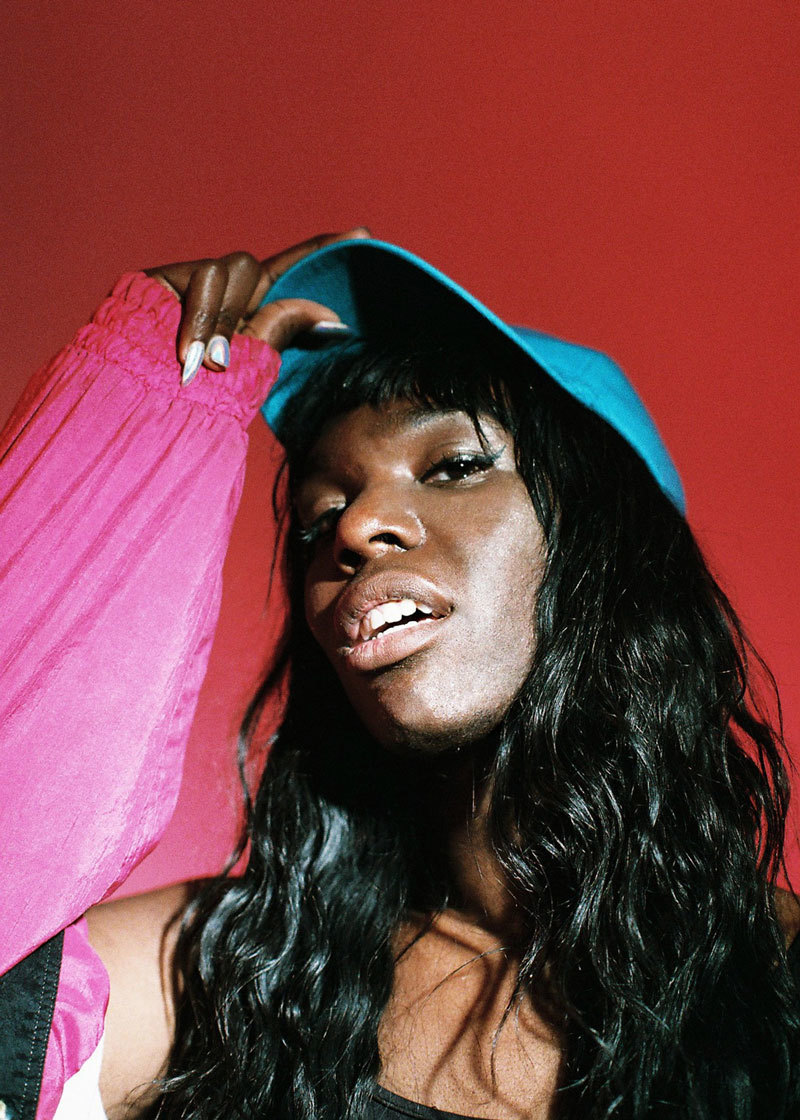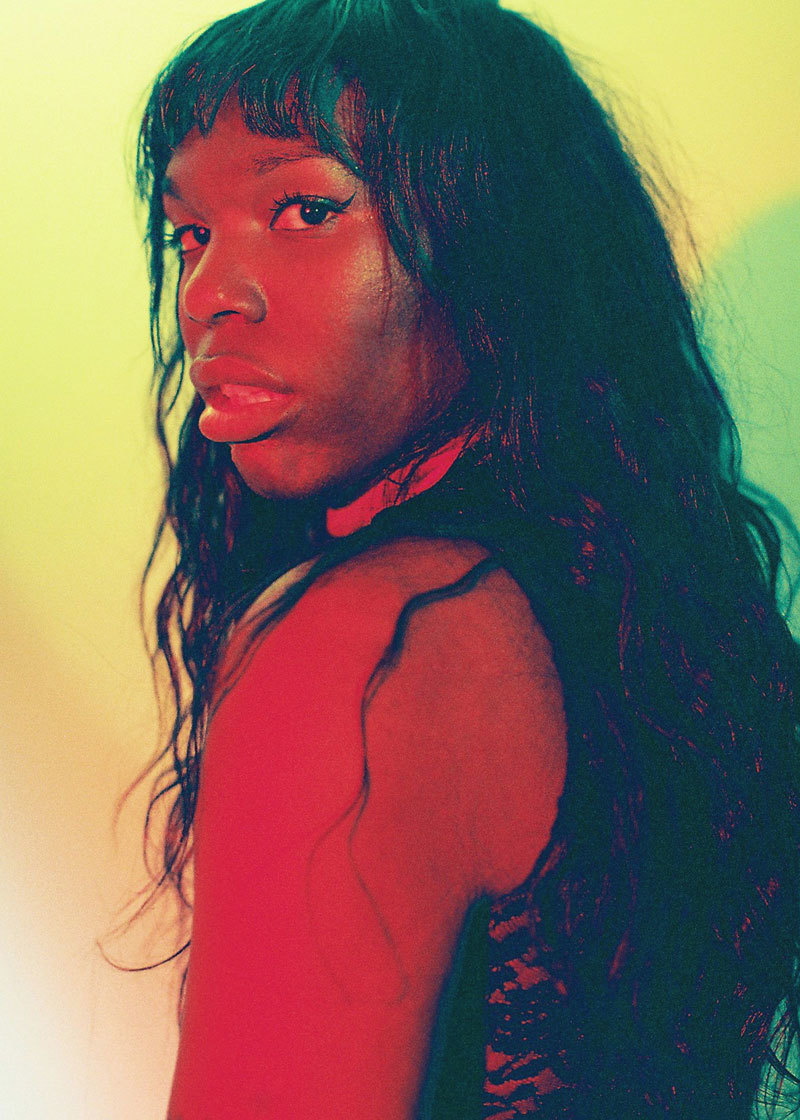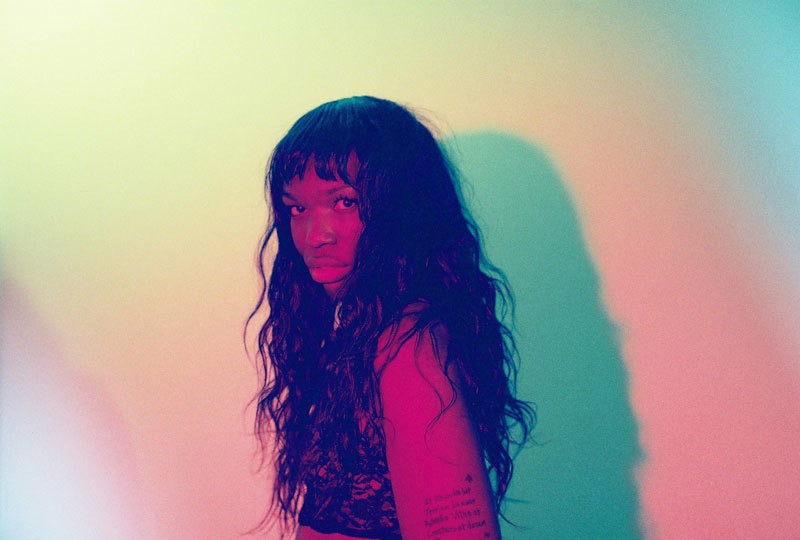Star Amerasu chose her own name. When she was transitioning as a teenager, she looked to the gods and goddesses across mythology who inspired her. Drawn to Japanese goddess Amaterasu, the artist remembers, “I wanted to embody what she stood for because she is the goddess of the sun and the universe. Her name literally means ‘shining one.'” Years later, listening to her new EP Rebecca — released under musical moniker Ah Mer Ah Su — it’s impossible to not draw a line between that early intervention and the music she’d end up making.
Across Rebecca‘s five tracks, Ah Mer Ah Su offers a direct and at times startlingly tender insight into her life. Yes, most songs — the good ones at least — feel personal in some way, as they endlessly track love and heartache. Ah Mer Au Su’s songs make such clear comments on mental health, loss, and frustration, it’s almost unsettling. The EP’s lead track, the endlessly catchy “Klonopin,” is not only a personal exploration of her own use of the drug, but also a mirror to the way we are taught to consider pharmaceuticals in our own lives. We challenge you to find another pop song that manages to so deftly navigate a complex, but not outright destructive, relationship with prescription drugs.
Currently touring around Australia this month, we called Ah Mer Ah Su to talk about using magic to fight misogyny and why people need to take their activism offline and confront how they treat the people in front of them.
I read that as a teenager, you were interested in mythology and witchcraft. Is that still part of your life?
My magic and my idea of believing in magic, spirituality, and mysticism still informs my work. My mom identifies as a spiritual practitioner, so ever since I was a kid, I have been around a new-age spiritual community. I believe in magic, I believe I have power in this world full of patriarchy and misogyny and transphobia. The only thing I really have that is my own is my beliefs and my hope and that’s fucking magical. Our hope and love can break down walls and barriers, we can change the world. I believe in community, and our ability to create spaces, is a really powerful magic, probably one of the biggest magics that we have in the world.
I wanted to start by talking about “Klonopin.” It’s gotten a lot of attention for how you’ve explored a relationship with medication. That’s something so common and so unseen. Can you tell me a little about your intention with that track?
When I wrote the song, I was having a really hard time dealing with loss. A friend of mine who was like a big sister took her own life. I was having a lot of anxiety about dying and I started taking Klonopin and doing lots of Molly to make myself calm down. I have this very tricky relationship with it because it’s a very addictive drug, so I wanted to write this song to remind myself that it’s okay and everyone has problems. People cope with their problems in a lot of different ways, and it was okay for me to be coping in that way at that moment. It wasn’t permanent, it’s just where I was.

Listening to this EP really made me think about how centered most albums are on love and heartbreak. This tackles that stuff but introduces so many quieter, more nuanced ideas, that actually felt a lot more real. When you sit down and explore mental health, or grief, are you speaking to yourself or the listener?
I write all of my songs for myself, I wouldn’t make music if I didn’t want to listen to it. I know other artists are like, ‘oh I hate listening to my stuff,’ but I’m not gonna lie, I love listening to my music. I made “Klonopin” for myself, but I knew other people in the queer community who also struggle with mental health. As people navigating this fucked-up society, a lot of us are struggling and feel alone. I wanted to make a song other people could listen to and enjoy but also be like, ‘wow, there are other people like me who have fucking problems.’
Even knowing you’re supporting people, what’s it like for you to put all this super-personal stuff out there?
It’s hard to be vulnerable; I’ve learned that you can’t always trust everyone. Even on my trip in Melbourne, I’ve realized communities are different all over the world and you really have to have a lot of self determination and belief in yourself to make it in this industry. Putting your heart on your sleeve means people can come at you. But knowing my emotions are true and sharing them can help other people is really what keeps me going.
I’ve gotten so many messages from trans women all over the world saying, ‘thank you for making music.’ It warms my heart so much to hear that something I created for myself, so my pain doesn’t live inside of me, helped them. So often as trans women, we don’t even have the time to think about how we feel because we are so busy just trying to survive. I’m always thinking about how I am going to survive in this world that is really built to put me down and hide me. I want other trans women to know we can be visible, we are beautiful beings.
On the other side of that is “Meg Ryan,” about a kind of woman who isn’t always asked to examine her place in the world. How do you use a song like that to speak to people outside of your community?
The song was very tongue-in-cheek to make people examine their privilege. Often, white feminists say, ‘we’re so oppressed as white women.’ Their feminism lacks the intersectional lens that says, ‘yes, white men dominate the world, but next comes white women.’ In a lot of spaces white women are able to go through their day without having to brush up against the idea their life can be taken away from them. Black trans women’s lives can be taken away just for simply existing.
I’ve had a lot of conversations with really ignorant white women who can’t see past their own privilege. So I made that song around the idea of being turned into Meg Ryan, into a white woman, and doing whatever I want. A lot of time I think white kids are taught that they can just follow their dreams. It’s not the same for a lot of other people.

Have you found people’s responses to your work is different when you play overseas, away from your home town of Oakland?
In Australia, it felt like the audience was more like, get on stage sing, get offstage. They wanted to absorb the music but I didn’t feel that warm of a reception from them. I’ve had the most weird and intense racist things happen to me in Australia and I know I’m not the only artist that’s had some really fucked up shit happen to them here. Even within the small queer community, it felt like people didn’t realize Australians have privileges Americans don’t. I know America is the center for a lot of culture, but a lot of artists are struggling and it’s a huge deal for me to even get this far.
I’m the only person in my family to ever come to Australia, I’m the only trans woman I know in my community to come here and perform, I’m one of the only trans women I know who has been able to create music in the way that I am. People were really happy to consume my media, but I feel the society here is still in this weird place where they’re not accepting of me as a person, but just me as content.
Like they want to tick these boxes to be this kind of person, maybe without putting in the emotional work?
Exactly. Like they have all the right words and they know all the right analysis, but in their interpersonal ways of actually being allies, a lot of Australians fall short. The intention is there, but that follow-through is not. Maybe it’s just because of how far away they are, but here everything is on the computer and I don’t hear a lot about protests happening like they do where I live in Oakland. We are protesting all the time, people are getting in the streets, we block highways and make a statement with our activism in an upfront and in-your-face kind of way. You can say a lot online, but how are you gonna treat the black person that’s right in front of you? I don’t want to critique too harshly as I have met a lot of great and amazing people here, but I noticed immediately people really don’t give a fuck, they just want me to get on stage and leave.
Credits
Text Wendy Syfret
Photography Elliott Lauren
